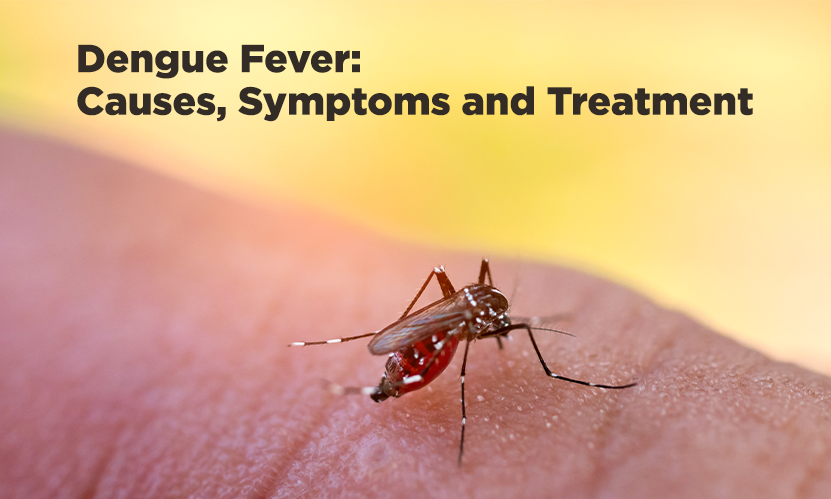Dengue fever, also known as breakbone fever due to the intense muscle and joint pain it causes, is often misdiagnosed as malaria or typhoid, so people suffering from it may not be getting the right treatment. However, a dengue fever test can reveal if you have contracted this potentially lethal disease. Here’s what you should know about dengue fever and how to get rid of it safely and quickly.
What is Dengue Fever?
Dengue fever is a mosquito-borne illness that can cause high fever, severe headache, pain behind the eyes and in the joints. There is no vaccine or specific treatment for dengue but it is possible to reduce the risk of infection by controlling mosquitoes through source reduction (reducing mosquitoes’ breeding grounds), use of insecticides (like mosquito coils) and wearing clothes that cover as much of the body as possible. A dengue test can be done to diagnose if you have contracted this disease.
Symptoms of Dengue Fever
If you think that you might have dengue fever lab tests can be performed to confirm a diagnosis. Laboratory tests usually include a complete blood count (CBC), examination of the blood smear for evidence of infection with dengue virus; immunoglobulin M (IgM) antibody capture enzyme-linked immunosorbent assay (MAC-ELISA) for confirmation; viral isolation from blood samples by cell culture.
Causes of Dengue Fever
The dengue fever virus is transmitted to humans by the bite of an infected mosquito. The incubation period ranges from 3-14 days. About a third of all cases are asymptomatic.
Don’t Miss : Trigoxin
Risk factors
Dengue fever is a mosquito-borne viral infection, caused by one of four related dengue virus serotypes (DENV-1, DENV-2, DENV-3, and DENV-4). In most cases, dengue fever goes away on its own in about five days, but it can be more serious in certain people, especially young children and the elderly.
Dengue fever is a mosquito-borne virus that can be fatal if not treated. There is no vaccine to prevent it. Dengue can be prevented by avoiding mosquito bites and taking care of personal hygiene. Dengue cannot be transmitted between humans, so a dengue test lab is unnecessary for diagnosis.
Complications
Since the symptoms of dengue fever are so varied, it is important to get an accurate diagnosis. Dengue fever can be misdiagnosed as malaria or typhoid fever, which have many of the same symptoms. If you are diagnosed with dengue fever and do not seek medical attention for your symptoms, you may become severely dehydrated or suffer from organ failure. The complications of dengue fever can be fatal without proper treatment.
Prevention
To prevent dengue fever, it is important to avoid getting bitten by mosquitoes. This can be done by wearing long-sleeved clothing and using mosquito repellent.
Vaccine
Many people living in areas where mosquitoes are present may be at risk for dengue fever. Dengue is transmitted to humans by the bite of an infected mosquito. There are four types of the virus – DEN-1, DEN-2, DEN-3 and DEN-4 – which are further classified as either serious or non-serious. The most common symptoms of dengue fever include fever (often a high fever), headache, vomiting, muscle aches and pains.
Prevent mosquito bites
To prevent mosquito bites, use an insect repellent containing DEET or picaridin. Wear long-sleeved shirts and pants. Stay in places with air conditioning or that use window/door screens to keep mosquitoes outside. Sleep under a mosquito bed net if you are overseas or outside and are not able to protect yourself from mosquito bites.
When to see a doctor
If you or someone you know has symptoms of dengue fever, it is important to see a doctor for diagnosis. Early diagnosis can lead to quicker treatment. A dengue test lab can be used to identify the virus in blood or fluid samples. Lab tests may also be used to determine whether an individual has been previously infected with another serotype of the virus. Dengue fever symptoms include muscle aches, fever, vomiting and joint pain.
The Cure
The best way to get rid of the virus is to receive a dengue test lab. Lab tests can be helpful in determining if you have the virus or not. If you are diagnosed with dengue fever, your doctor will give you treatment for your symptoms. Dengue fever can be managed at home by following your doctor’s instructions and taking care of yourself.
Conclusion
Dengue fever is an infectious disease caused by the dengue virus, which is spread to humans by infected mosquitoes. In order to successfully diagnose and treat dengue fever, it’s important to know what symptoms to look out for so you can tell if you have it or someone in your family does, what causes it, and how to treat it correctly with medication and rest. Above article will help you understand dengue fever better so that you can fight the symptoms and prevent another bout of dengue fever in the future!
















